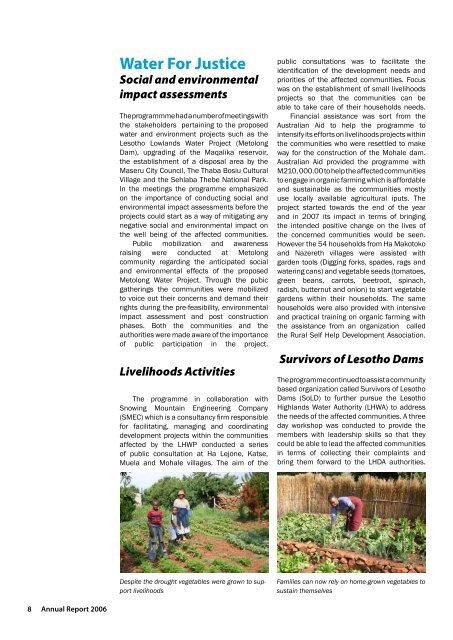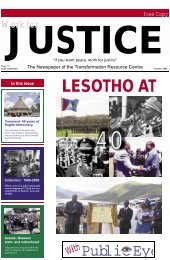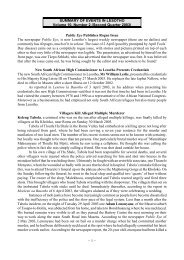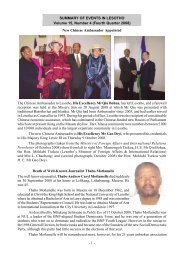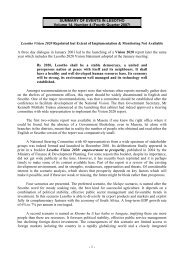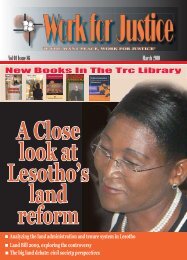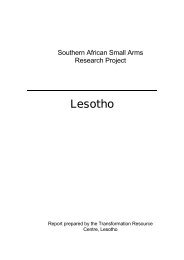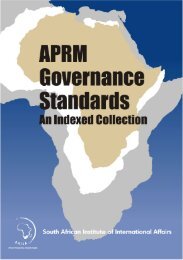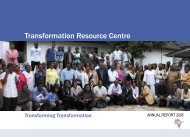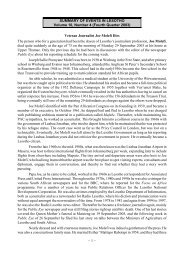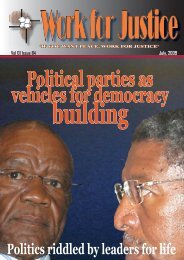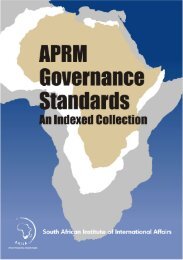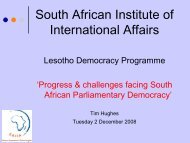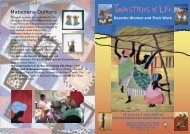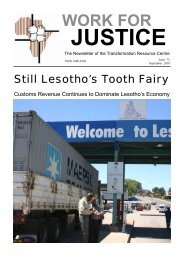2006 - the Transformation Resource Centre
2006 - the Transformation Resource Centre
2006 - the Transformation Resource Centre
You also want an ePaper? Increase the reach of your titles
YUMPU automatically turns print PDFs into web optimized ePapers that Google loves.
Water For Justice<br />
Social and environmental<br />
impact assessments<br />
The programmme had a number of meetings with<br />
<strong>the</strong> stakeholders pertaining to <strong>the</strong> proposed<br />
water and environment projects such as <strong>the</strong><br />
Lesotho Lowlands Water Project (Metolong<br />
Dam), upgrading of <strong>the</strong> Maqalika reservoir,<br />
<strong>the</strong> establishment of a disposal area by <strong>the</strong><br />
Maseru City Council, The Thaba Bosiu Cultural<br />
Village and <strong>the</strong> Sehlaba Thebe National Park.<br />
In <strong>the</strong> meetings <strong>the</strong> programme emphasized<br />
on <strong>the</strong> importance of conducting social and<br />
environmental impact assessments before <strong>the</strong><br />
projects could start as a way of mitigating any<br />
negative social and environmental impact on<br />
<strong>the</strong> well being of <strong>the</strong> affected communities.<br />
Public mobilization and awareness<br />
raising were conducted at Metolong<br />
community regarding <strong>the</strong> anticipated social<br />
and environmental effects of <strong>the</strong> proposed<br />
Metolong Water Project. Through <strong>the</strong> pubic<br />
ga<strong>the</strong>rings <strong>the</strong> communities were mobilized<br />
to voice out <strong>the</strong>ir concerns and demand <strong>the</strong>ir<br />
rights during <strong>the</strong> pre-feasibility, environmental<br />
impact assessment and post construction<br />
phases. Both <strong>the</strong> communities and <strong>the</strong><br />
authorities were made aware of <strong>the</strong> importance<br />
of public participation in <strong>the</strong> project.<br />
Livelihoods Activities<br />
The programme in collaboration with<br />
Snowing Mountain Engineering Company<br />
(SMEC) which is a consultancy firm responsible<br />
for facilitating, managing and coordinating<br />
development projects within <strong>the</strong> communities<br />
affected by <strong>the</strong> LHWP conducted a series<br />
of public consultation at Ha Lejone, Katse,<br />
Muela and Mohale villages. The aim of <strong>the</strong><br />
public consultations was to facilitate <strong>the</strong><br />
identification of <strong>the</strong> development needs and<br />
priorities of <strong>the</strong> affected communities. Focus<br />
was on <strong>the</strong> establishment of small livelihoods<br />
projects so that <strong>the</strong> communities can be<br />
able to take care of <strong>the</strong>ir households needs.<br />
Financial assistance was sort from <strong>the</strong><br />
Australian Aid to help <strong>the</strong> programme to<br />
intensify its efforts on livelihoods projects within<br />
<strong>the</strong> communities who were resettled to make<br />
way for <strong>the</strong> construction of <strong>the</strong> Mohale dam.<br />
Australian Aid provided <strong>the</strong> programme with<br />
M210, 000.00 to help <strong>the</strong> affected communities<br />
to engage in organic farming which is affordable<br />
and sustainable as <strong>the</strong> communities mostly<br />
use locally available agricultural iputs. The<br />
project started towards <strong>the</strong> end of <strong>the</strong> year<br />
and in 2007 its impact in terms of bringing<br />
<strong>the</strong> intended positive change on <strong>the</strong> lives of<br />
<strong>the</strong> concerned communities would be seen.<br />
However <strong>the</strong> 54 households from Ha Makotoko<br />
and Nazereth villages were assisted with<br />
garden tools (Digging forks, spades, rags and<br />
watering cans) and vegetable seeds (tomatoes,<br />
green beans, carrots, beetroot, spinach,<br />
radish, butternut and onion) to start vegetable<br />
gardens within <strong>the</strong>ir households. The same<br />
households were also provided with intensive<br />
and practical training on organic farming with<br />
<strong>the</strong> assistance from an organization called<br />
<strong>the</strong> Rural Self Help Development Association.<br />
Survivors of Lesotho Dams<br />
The programme continued to assist a community<br />
based organization called Survivors of Lesotho<br />
Dams (SoLD) to fur<strong>the</strong>r pursue <strong>the</strong> Lesotho<br />
Highlands Water Authority (LHWA) to address<br />
<strong>the</strong> needs of <strong>the</strong> affected communities. A three<br />
day workshop was conducted to provide <strong>the</strong><br />
members with leadership skills so that <strong>the</strong>y<br />
could be able to lead <strong>the</strong> affected communities<br />
in terms of collecting <strong>the</strong>ir complaints and<br />
bring <strong>the</strong>m forward to <strong>the</strong> LHDA authorities.<br />
Despite <strong>the</strong> drought vegetables were grown to support<br />
livelihoods<br />
Families can now rely on home-grown vegetables to<br />
sustain <strong>the</strong>mselves<br />
Annual Report <strong>2006</strong>


